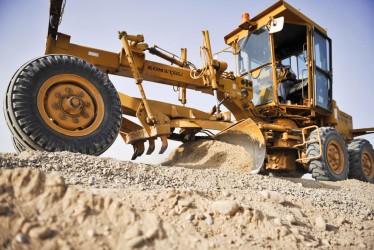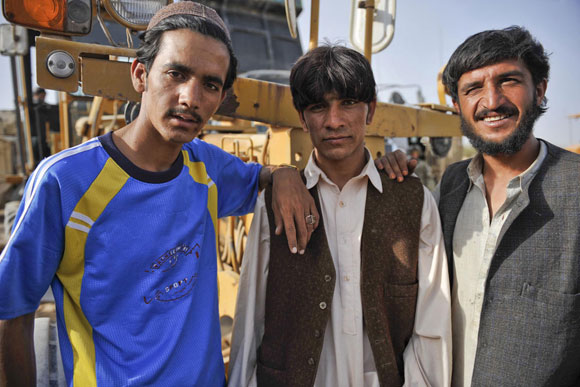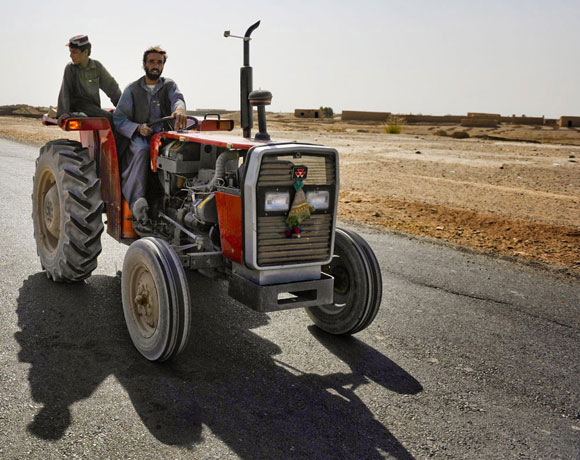Last week, because of the weather, you may have had to walk to work. But when you get into your car most mornings you probably don't think twice about the journey ahead.

Roads are built and maintained in the UK everyday. And if you're like me, you take all this work for granted - except for getting irritated when I stumble across road works that weren't there the day before.
The Asia Foundation released their 2010 Survey of the Afghan People last month. The people of the South West of Afghanistan, which includes Helmand Province, said their biggest development priority was roads.
I was particularly pleased to read this, for two reasons.
Firstly, the people I live with in Afghanistan like to make fun of the fact that I manage road projects. More than once I've had to endure feigned yawns as I talk about the progress we are making. I walked home after the Asia Foundation presentation in our office feeling suitably smug.
And secondly, because it confirmed my view that the work we are doing to build roads in Helmand is really valued by the people who live there.

It is important that the people we are trying to help feel listened to. Ultimately these people know the needs of the community best. Imagine you were asked by your council what your town needed. You say a car park, but they build you a bus stop instead. Eventually you'd stop believing in your local authority.
The UK is on track to build or upgrade over 40km of road in Helmand in the next 12 months. You'd be amazed at the planning that goes into the roads before the shovel hits the ground. Detailed design, soil tests, mapping, acquiring land…the list goes on.
Roads in Helmand have been traditionally made of gravel. This is mainly because the material is available and cheaper to source, but they're not necessarily the best roads.

The roads we are working on will be coated in asphalt (that's tarmac to you and me). Not only are asphalted roads quicker to drive on but they also provide better security. It's much harder to plant explosives into asphalt roads, so people are more willing to travel on them. I think that's worth the extra cost.
These roads will help the people both socially, so parents can drive their children to school safely, and economically, to ensure farmers can access markets to sell their products. Around 80% of Helmandi's rely on agriculture for their income - so it's no wonder that roads matter to the people of Helmand.
If someone talked to me about roads I'd probably be yawning too (before I started this job anyway). But now I think it's really interesting. When you wake up tomorrow morning and get in your car, take comfort in the fact that someone has put a lot of effort into ensuring that you get to work as quickly as you can. It's just a shame that they can't do much about the snow.

5 comments
Comment by U.K. Improves Infrastructure and Road Building in Afghanistan | The Asia Foundation News posted on
[...] A post on U.K. Department for International Development’s blog discusses the U.K.’s infrastructure progress and road building in Helmand province in Afghanistan. The author references The Asia Foundation’s Afghanistan in 2010: A Survey of the Afghan People as stating that the people of the South West of Afghanistan think their biggest development priority is roads. Read the full post: “Roads work.” [...]
Comment by Jo Shayer posted on
Carrie,
Thanks for your blog post - really interesting stuff. Saw the piece in Metro as well. I don't think we can underestimate the importance of roads. As you say it's more than getting from A to B, it's providing people with access to markets and livelihoods and showing that the national and provincial Government can deliver. On the latter point, not sure if you're aware but I've dug out this blog from Tim Gurney. He's in at the deep end in Nad-e-Ali as a stabilisation adviser. Makes a fascinating read!
Best,
Jo
http://www.stabilisationunit.gov.uk/index.php/our-people/new-blogger-time-gurneys-afghanistan-blog
Comment by Carrie posted on
Hi Jo,
Thanks for your comment.
Tim and the other Stabilisation Advisors (we call them StabAds!) are all employed by the Stabilisation Unit. This Unit is co financed by the department I work for, the Department for International Development (DFID), alongside the Foreign and Commonwealth Office (FCO) and the Ministry of Defence (MoD). As you say Tim and the other StabAds are really in at the deep end. They interact with the local population daily and the community rely on the StabAd and a put a lot of trust in them to deliver. They gain an appreciation and understand of the immediate and long term needs of the community in a way that people like me are simply can't when we visit for a few days or hours. We call on the StabAd's knowledge and experience as much as we can.
The StabAds I have met all share similar qualities. They tend to be very hard working, love being around people and like solving problems. They also enjoy living in places that most people wouldn't go near! It's a really challenging job, but I've heard it is hugely rewarding - and, as you say, certainly makes a fascinating read.
Hope u keep enjoying the blogs.
Carrie.
Comment by Rajan Shrestha posted on
Dear Carrie,
hi, this is Rajan from Nepal.I just read your blogs today, I really enjoy reading about the work that you did for Afganistan people. That sounds pretty good.I wish you a very good luck for you to serve more people of the world as the Jesus did in his time.Bye the way, I'm also Rural Development student at the moment and use to visit DFID Nepal to gain more and more current and recent news .Also I used to read aloads of DFID magazines .Thankyou..
Blessing
Rajan
Comment by Jenifer posted on
I for one think this was a excellent article. There may have been a couple of additional information, sure, but what was
said was said brilliantly and I couldn't agree more. Any further articles on this niche forthcoming? Lets hope so.